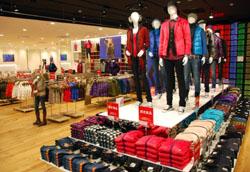 Supermarkets and department stores are churning out low-priced clothing, actively taking part in the planning and production phases to become manufacturing retailers.
Supermarkets and department stores are churning out low-priced clothing, actively taking part in the planning and production phases to become manufacturing retailers.
"With this price, coming all the way here paying train fares is worth it," said a man in his 60s who traveled from Tokyo to the Jusco Tsudanuma store in Narashino, Chiba Prefecture. The store is run by the Aeon Co. group.
He visited the store to buy three pairs of jeans priced at ¥880 each produced in August by Aeon Topvalu Co. and marketed by Aeon Co. They were put on the market to counter the ¥990 jeans marketed this spring by stores under stores under the wing of Fast Retailing Co.
"Clothing made in Japan is still priced higher," said Shigemitsu Yamada, a director of Aeon Topvalu. The company produces good quality but cheap products by negotiating independently with a Chinese clothing factory, including over the selection of cloth.
Manufacturers are normally reluctant to increase the variety of waist sizes and pants lengths due to the burden on inventory, but distributors can take the risk because they can predict sales with precision.
Aeon Topvalu produces 63 combinations of waist sizes and pant lengths for its slim-fitting jeans, including for middle-aged and older men, many of whom have a bigger waist and shorter legs.
The need to do something was clear. Clothing sales at supermarkets nationwide in the first half of this year fell 11.9 percent from the year before, while those at department stores in July plunged 15.6 percent, marking the 25th consecutive monthly decline.
Sogo & Seibu Co., under the wing of Seven & I Holdings Co., created a division to develop private-brand products in September. Amid a growing customer tendency to favor low-priced products, the company has tied up with a clothing enterprise dealing with mass-sales stores.
The company will market women's clothing 40 percent cheaper than usual prices.
J Front Retailing Co., with Daimaru Inc. and Matsuzakaya Co. under its wing, will also market new brand clothing for women in their 40s in a tieup with a wholesaler dealing with mass-sales stores.
High-end clothing for such women is already available at department stores, but there has been little casual clothing on the market. The company will increase the selection of clothing priced 40 percent to 50 percent lower to gain customers. The selection includes a jacket priced at ¥16,000.
Takashimaya Co. has planned jointly with a manufacturer to produce a jacket with an inner pocket in which a business-card holder can be set — an unusual feature for women. Its price is 20 percent less than that of an ordinary jacket, and the target is female managers with deep pockets.





